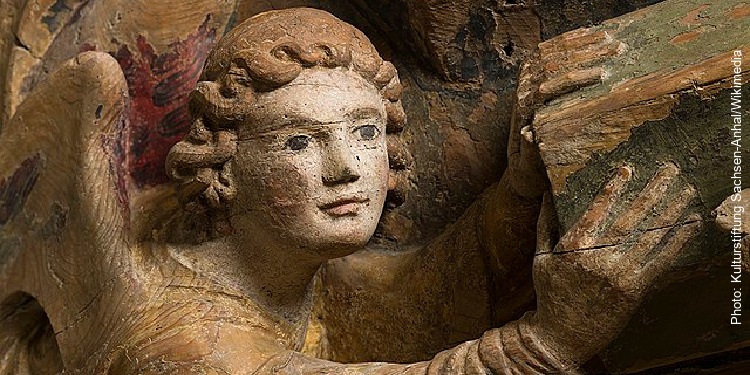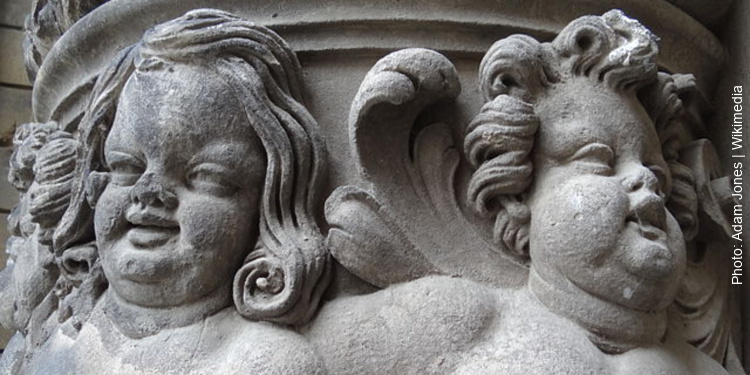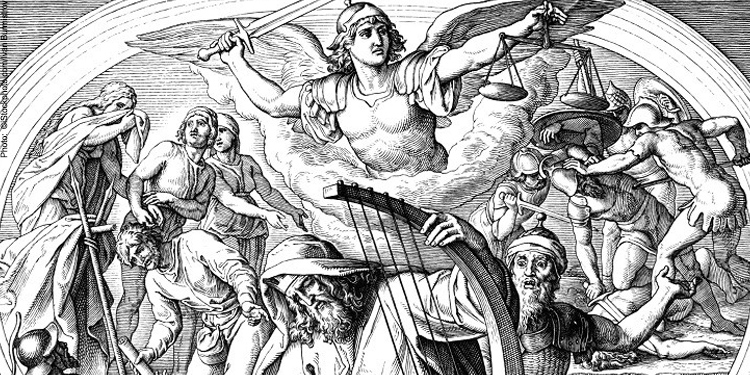Angels in the Bible
We have all heard about the angels in the Bible. But what do we know about them? Jewish tradition believes that there is a spiritual world that exists parallel to our physical world. While so much of this spiritual reality is hidden from our eyes, we believe that these worlds are inextricably intertwined; the happenings of the physical world influence and reflect the spiritual world and vice versa. We pray to a God who is invisible and incorporeal, knowing that His actions above will have a real impact down below. The Jewish view on angels is another facet of this belief.
In one of the most famous scenes of the Bible, Jacob dreams of a ladder spanning heaven and earth, with angels ascending and descending upon it. The ladder symbolizes the bridge that connects between the physical world and the heavenly realms, and the angels are God’s unseen couriers on this bridge. Even our forefather was surprised by this glimpse into the spiritual world: “When Jacob awoke from his sleep, he thought, ‘Surely the Lord is in this place, and I was not aware of it’” (Genesis 28:16). Jacob understood that God’s angels are all around us, even if we don’t know it.

In Jewish tradition, we sing “Shalom Aleichem” to these angels when they accompany us home from synagogue on the Sabbath eve, and we call on them to guard us as we go to sleep and to protect us when we go on a long journey. The most common Hebrew word for angels is malachim, which can also mean “messengers.” Angels are God’s messengers, His army of helpers, charged with guiding, protecting, challenging, and helping human beings. As it says in Psalms, “For he will command his angels concerning you to guard you in all your ways” (91:11).
Throughout this article, we will delve into this mysterious topic, exploring the different types of angels in Jewish tradition, some of the encounters with angels mentioned in the Bible, the purpose they serve in the world, and more.
Why Do Angels Exist?
God created these celestial beings with the sole purpose of carrying out His will. While worthy of awe and respect, they should not be worshiped instead of God, and they do not have the ability to change reality. They do not have free will or autonomy, like human beings, but rather were created to fill specific roles on behalf of God, such as delivering messages to human beings, protecting people, fighting evil forces, or praising and worshiping God. While the creation of angels is not detailed in the Bible, the Jewish sages explain that they were created prior to human beings.
Types of Angels
There are several types of angels, each with specific attributes and roles in the world. The Hebrew Bible does not provide any detailed explanation of what they are, how they look, or how they are classified, but later Jewish texts have provided a more thorough understanding of Jewish angelology.
Malachim:
As mentioned above, the most common type of angels in Jewish thought are malachim, messengers charged with delivering divine messages to human beings on earth. This term appears many times throughout the Bible, sometimes referring to human messengers and sometimes to divine beings, such as in Exodus: “See, I am sending an angel ahead of you to guard you along the way and to bring you to the place I have prepared” (23:20).
Cherubim:
Cherubim are often depicted as winged creatures responsible for guarding sacred spaces, such as the two golden figures that rested on top of the Ark of the Covenant in the Temple. Cherubim are mentioned in various Biblical passages, including Exodus 25: “There, above the cover between the two cherubim that are over the ark of the covenant law, I will meet with you and give you all my commands for the Israelites” (v. 22).

Seraphim:
Described as fiery, radiant beings with many wings, seraphim are generally associated with divine worship and praise, as mentioned in Isaiah 6:2-3: “Above him were seraphim, each with six wings: With two wings they covered their faces, with two they covered their feet, and with two they were flying. And they were calling to one another: ‘Holy, holy, holy is the Lord Almighty; the whole earth is full of his glory.’”
B’nai Elohim:
Directly translated as “the sons of God,” this term is used to refer to divine beings that appear in council before God, such as those mentioned in Job “One day the angels came to present themselves before the LORD, and Satan also came with them” (1:6).
Although not explicitly mentioned in the Bible, Jewish mysticism and folklore mention other types of angels, such as guardian angels charged with protecting people and angels who record the deeds of each individual for future judgment.
How Are Angels Described in the Bible?
As mentioned above, angels take on many different forms in the Bible. In Isaiah 6:2, Seraphim are depicted with six wings. In Ezekiel 1:10, angels are described as having multiple faces: “Each of the four had the face of a human being, and on the right side each had the face of a lion, and on the left the face of an ox; each also had the face of an eagle.”
However, in many Bible stories, the angels look like regular people, such as the three men who visit Abraham in Genesis 18, the two men who appear to Lot in Genesis 19, and the man who wrestles with Jacob in Genesis 32. Despite being called “men” in the text, Jewish tradition understands these characters to be angels.
Bible Verses About Angels
Among the references to angels in the Bible and later Jewish texts, some are explicit and others are vague. While the scope of this article does not allow us to detail every biblical mention of angels, we will provide several examples below.

Abraham and the Three Visitors (Genesis 18):
Three days after his circumcision, Abraham sat at the opening of his tent, waiting for visitors. Three “men,” understood by Jewish tradition to be angels, appeared, delivering the surprising news that Sarah would become pregnant, despite her age.
Hagar in the Wilderness (Genesis 16):
After being mistreated by Sarah, her pregnant maidservant Hagar fled from home. An “angel of the Lord” appeared to Hagar in the desert. He told her to return to Sarah and promised that she would birth a large nation through her son, Ishmael.
Lot and the City of Sodom (Genesis 19):
God sent two angels to the evil city of Sodom to rescue Lot and his family before He destroyed the city.
Jacob Wrestling with an Angel (Genesis 32):
On the eve of his tense reunion with his brother Esau, “a man wrestled with him till daybreak.” Jacob understood that this “man” was really an angel, and he demanded that the angel bless him. The angel gave him a new name, Israel, “because you have struggled with God and with humans and have overcome.”
The Burning Bush (Exodus 3):
In Moses’ first encounter with the supernatural, an “angel of the Lord appeared to him in flames of fire from within a bush,” instructing him to lead the Israelites out of Egypt.
Gideon and the Angel (Judges 6):
After years of oppression at the hands of the Midianites, the Israelites called out to God. An “angel of the LORD” appeared to the judge, Gideon, assuring him that “The LORD is with you, mighty warrior.”
Balaam’s Donkey (Numbers 22):
The Moabite king Balak hired the prophet Balaam to curse the Israelities. Balaam was on his donkey en route to meet Balak when “the donkey saw the angel of the Lord standing in the road with a drawn sword in his hand.” Unable to see the angel, Balaam beat his donkey until God opened his eyes, revealing the angel. The angel told Balaam that the donkey had saved him from a path that would lead to his destruction. Balaam acknowledged his sin, and ultimately blessed the Israelites instead of cursing them.
These are just a few of the notable encounters with angels in the Hebrew Bible, instances where angels served as messengers of God, delivering important messages, guidance, and reassurance to biblical figures.
Who Are the Angels in the Bible?
While Jewish tradition does not detail exactly how many angels exist, they are portrayed as numerous, sometimes described as “a multitude.” For example, Daniel 7:10 mentions “thousands upon thousands” and “ten thousand times ten thousand” angels in the heavenly court.
That being said, several individual angels are mentioned by name in the Bible. Perhaps the most well-known, Gabriel serves as a messenger who appears to deliver important announcements, such as in Daniel 9:21-22: “while I was still in prayer, Gabriel, the man I had seen in the earlier vision, came to me in swift flight about the time of the evening sacrifice. He instructed me and said to me, ‘Daniel, I have now come to give you insight and understanding.’” Gabriel also announced the births of John the Baptist and Jesus in the Gospel of Luke.

Another prominent angel in the Bible is Michael. He is described as a protector of man and a warrior against evil forces, such as in Daniel 12: “At that time Michael, the great prince who protects your people, will arise. There will be a time of distress such as has not happened from the beginning of nations until then. But at that time your people—everyone whose name is found written in the book—will be delivered” (v. 1). So, too, in the Christian Bible, Michael appears as one who contends with the devil (Jude 1:9).
There are other specific angels who are not mentioned by name in the Hebrew Bible, but do appear in later texts. For example, Raphael is known as the archangel of healing and guidance, Uriel is considered the archangel of wisdom and enlightenment, and Metatron is described in Kabbalistic texts as “the king of angels,” a heavenly scribe with an exalted position in the celestial hierarchy.
How Do Angels Impact Our Daily Lives?
Despite the fact that we cannot see them and do not fully understand them, simply knowing that angels exist can transform the way we live our lives.
The story of Jacob reminds us that the people that appear in our lives to challenge us may actually be angels here to help us grow and self-actualize. Even if disguised as adversity, trials, and tribulations, we must remember that angels are always God’s agents sent to help us on our spiritual journey.
So, too, the story of Balaam teaches us that sometimes when our lives don’t go according to plan, there may be unseen forces at work directing us to become better people. When these forces are revealed to us, they may look scary, but that does not mean they are bad. The Jewish sages teach that the heavenly being blocking the donkey’s path looked like the angel of death, but that it was actually the angel of mercy, sent by God to save Balaam from choosing the wrong path.
In 2 Kings 6, the king of Aram sent a mighty army, including hundreds of horses and chariots to surround the city and capture the prophet Elisha. Elisha’s servant began to panic, but Elisha told him, “Don’t be afraid… Those who are with us are more than those who are with them.” Elisha prayed to God to open the eyes of his servant, and suddenly, the servant saw that the surrounding hills were full of horses and chariots of fire. This was God’s army of angels, ready to protect and defend Elisha. This story reminds us that even in times of fear, doubt, and uncertainty, we must have faith that we are being protected by God’s angels, even if we cannot see them. As we read in Psalms 34:7, “The angel of the Lord encamps around those who fear him, and he delivers them.”

The story of Abraham and his three mysterious guests reminds us that sometimes the regular people that appear in our lives may actually be angels. If we treat every person we encounter with the kindness and respect that we would shower upon a divine being who was sent specially to us by God, we will make the world a much kinder place.
Finally, these angels remind us that there is nothing more exalted than doing God’s will on earth. While the angels have no choice in this matter, as human beings with free will, we do. Every time we give charity to one of God’s children in need, we are acting as His agent on earth. When we speak words of encouragement to someone who desperately needs them, we can be an angel in someone else’s life. Every time we clothe the naked, feed the hungry, or give shelter to those with nowhere else to go, we are acting as God’s messenger. Our days are full of opportunities to be an angel to our family, friends, coworkers, and strangers. While we cannot always see the angels that surround us, or recognize their identity when they are around us in human form, that does not mean that they are not there. There are many angels among us—and we can be angels, too.
Discover More Resources in Our Learning Center
Learn more about Jewish Holidays, Hebrew words, and Israel in The Fellowship Learning Center.
